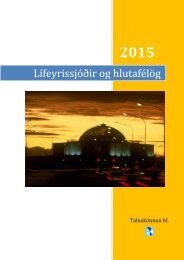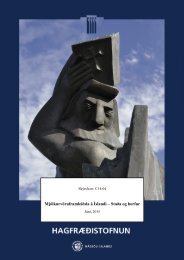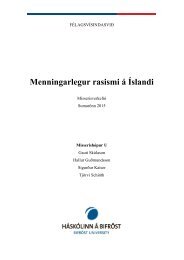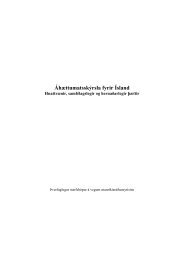You also want an ePaper? Increase the reach of your titles
YUMPU automatically turns print PDFs into web optimized ePapers that Google loves.
WORLD REPORT 2016<br />
HUMAN RIGHTS WATCH<br />
Since October 2014, authorities have actively sought to arrest anyone associated<br />
with Group 24, convicting several people in Tajikistan on vague charges of extremism<br />
and seeking the extradition of activists for the group who live in Russia,<br />
Belarus, and Moldova.<br />
In July, a Dushanbe court sentenced Maksud Ibragimov, leader of the opposition<br />
group Tajikistan’s Youth for Revival, to 17 years’ imprisonment for extremism.<br />
Ibragimov said that Tajik security services kidnapped him off the street in<br />
Moscow, where he had lived for more than 10 years, and forced him onto a plane<br />
bound for Dushanbe, where he was immediately arrested.<br />
In another case, on July 15, Belarusian authorities detained peaceful Tajik activist<br />
Shabnam Khudoydodova as she was crossing the Russian-Belarusian border.<br />
A member of Group 24 who lived in St. Petersburg, Khudoydodova publicly<br />
called for reforms in Tajikistan. After learning that security services might be<br />
preparing to forcibly return her to Tajikistan, Khudoydodova fled to Belarus,<br />
where she sought refugee status. At time of writing, Tajik authorities were seeking<br />
her extradition on extremism charges.<br />
Sobir Valiev, deputy head of the opposition group the Congress of Constructive<br />
Forces, and Group 24, was detained in August for several weeks by Moldovan migration<br />
police in the Moldovan capital of Chisinau. The Moldovan police detained<br />
him on a request from the Tajik government, which sought his extradition<br />
on similar extremism charges.<br />
In the run-up to Tajikistan’s parliamentary elections, the government sought to<br />
suppress the activities of the Islamic Renaissance Party of Tajikistan (IRPT), the<br />
country’s leading opposition party. In March, for the first time in Tajikistan’s<br />
modern history, the party was unable to win any seats in parliamentary elections.<br />
Monitors from the Organization for Security and Co-operation in Europe<br />
said the vote was marred by ballot-stuffing and government intimidation.<br />
In June, IRPT’s leader, Muhiddin Kabiri, went into exile, fearing prosecution on<br />
bogus charges. That same month, 20 videos appeared online of IRPT members<br />
saying they were “voluntarily” abandoning the party. Mahmadali Hayit, the IRPT<br />
deputy head, said members were acting under pressure from officials. In public<br />
statements and sermons, some officials and state-controlled imams have also<br />
tried to link the IRPT to Islamic terrorism.<br />
The Justice Ministry banned the party in August.<br />
In September, following clashes between government forces and militants loyal<br />
to Abduhalim Nazarzoda, the deputy defense minister, which left at least 17<br />
fighters and 9 police officers dead, authorities arrested dozens of IRPT members,<br />
accusing them of involvement in the violence, despite a lack of evidence.<br />
By November, authorities had arrested or detained approximately 200 IRPT<br />
members as well as at least 3 lawyers—Buzurgmehr Yorov, Nouriddin Mahkamov,<br />
and Dilbar Dodadzhonova—who sought to represent the detained IRPT members.<br />
The charges brought against them for fraud appeared to be trumped-up<br />
and retaliatory for their attempts to represent the detained IRPT members.<br />
Freedom of Expression<br />
Authorities’ restrictions on media freedoms and access to independent information,<br />
including on the Internet, and the intimidation of journalists and NGOs, violated<br />
Tajikistan’s obligations on freedom of expression.<br />
On July 20, authorities announced a rule barring media outlets from reporting<br />
“official news” without citing Khovar, the state-run news agency. Nuriddin<br />
Karshiboev, head of Tajikistan’s National Association of Independent Media,<br />
condemned the move, saying the regulation violates the constitution’s guarantee<br />
of equal access to official information.<br />
Other news outlets known for reporting critical views told Human Rights Watch<br />
they have been subjected to increasing pressure in 2015, with security services<br />
frequently interrogating staff and demanding advance notification of any potentially<br />
critical stories.<br />
Under the pretext of protecting national security, Tajikistan’s state telecommunications<br />
agency regularly blocks websites that carry information potentially critical<br />
of the government, including Facebook, Gmail, Radio Ozodi, the website of<br />
Radio Free Europe’s Tajik service, and opposition websites.<br />
In August, a Dushanbe court convicted journalist Amindzhon Gulmurodzoda of<br />
forgery, sentencing him to two years’ imprisonment. Gulmurodzoda is editor of<br />
the news site faraj.tj.com and works for the Center for Investigative Journalism.<br />
Security services accused Gulmurodzoda of obtaining falsified documents in<br />
1989, when he would have been five or six years old. They claimed his passport,<br />
558<br />
559










